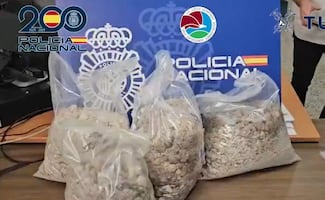Más Información

VIDEO: EU intercepta otro petrolero sancionado, ahora en el Caribe; suman dos buques incautados este miércoles

VIDEO: Desarticulan en Europa red de tráfico de metanfetamina ligada al Cártel de Sinaloa; era introducida en mármol importado de México

Trump recibirá a petroleras el viernes para hablar de Venezuela; EU pide acceso total a explotación de petróleo

Sheinbaum aborda con cónsules y embajadores situación en Venezuela y EU; revisan planes para 2026 y “momento histórico”

Josefa González-Blanco, la embajadora que da paso a Gertz Manero en Reino Unido; estas son sus polémicas
As the U.S. government reworks a supply deal with Mexico, a top player in one of the world's largest sugar markets is crying foul and claims competitors are using the trade talks to deny it access to cheap Mexican sugar imports.
Mexico is the top supplier to the U.S. sugar industry and negotiators from both countries are in talks to change a 2014 trade pact that prescribes the balance of raw and refined sugar that heads north to ensure U.S. refiners have what they need.
But CSC Sugar LLC, which produces liquid sugar to sweeten ice cream and make frosted coatings, said the proposals would exclude it and others from the export quota allotted to Mexico.
That would effectively force it to source sugar elsewhere, limiting its supply options and potentially hurting competition in a market already dominated by a few players, said Paul Farmer, president of CSC.
Farmer said the issue is being pressed by a coalition of U.S. sugar companies that are facing competition from his five plants around the country. The trade pact is being used as a "tool to reduce competition," he said.
"We believe it's unfair, possibly illegal, and the Department of Commerce does not have the legal authority to determine who gets sugar supplies."
A spokesman for the Department of Commerce, which agreed on the sugar trade deal with Mexico and is negotiating the changes, did not respond to requests for comment on the negotiations.
Among the terms that the U.S. sugar industry has proposed to Mexico are clauses that specify what type of refiner can receive Mexican imports under the deal, according to a copy of the desired terms seen by Reuters and sources familiar with the discussions.
The clauses would prohibit Mexican exporters from selling tariff-free sugar to meet import quotas under the deal to companies such as CSC that make liquid sugar.
The changes would favor big cane refiners such as ASR Group, the maker of Domino Sugar and other brands, and Louis Dreyfus Co's Imperial Sugar Company.
Representatives for ASR Group, Louis Dreyfus and the American Sugar Alliance, which represents the coalition of sugar companies involved in the trade dispute with Mexico, declined to comment.
"UN-AMERICAN"
Negotiators from both sides restarted talks on Friday to alter the 2014 trade deal, which established quotas and minimum prices for imports of raw and refined sugar from Mexico.
That deal ended a trade spat brought by the United States against Mexico for hurting the U.S. sugar industry by selling cheap, subsidized sugar to its northern neighbor.
Now, the U.S. industry is pushing for a change to the agreement that would ensure more raw sugar supplies and specify to which types of companies Mexico's mills can sell.
The changes aim to quell complaints from ASR and Imperial that supplies under the deal are insufficient and that the 2014 agreement has not eliminated the harm to the U.S. industry inflicted by cheap sugar from Mexico.
CSC has transformed itself from trader to processor by building a handful of plants that liquefy sugar across the country since 2009.
Noticias según tus intereses
[Publicidad]
[Publicidad]









